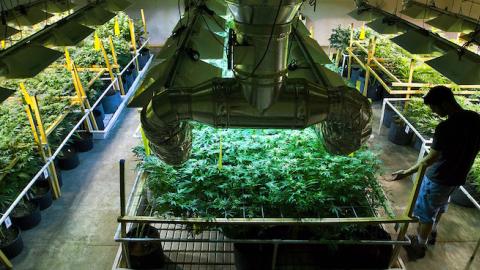Conventional wisdom has been bullish regarding the potential profits from investing in commercial marijuana businesses, now considered legal in several states but not under federal law. There have even been glossy brochures from consulting firms, offering the lure of potential billions in sales for the savvy investor.
But there remain very substantial obstacles to those glittering inducements. A recently-published advisory from American Bar Association analyzed the malpractice liability for physicians who recommend "medical marijuana," warning:
Authorizing physicians to certify or recommend medical marijuana does not, in any way, absolve them from rendering competent and scientifically informed medical care. . . . although their actions may not be criminally culpable in legalizing states, they are nonetheless recommending or certifying a non-FDA-approved treatment that is not supported or recognized by the large majority of their professional colleagues.
Of course, it is not just physicians who run liability risks in providing dangerous products. Trafficking in illicit drugs has always been tenuous for corporations who might thereby jeopardize the reputation of their legitimate brands. In response, legalization advocates have pointed to surging support for legal, recreational marijuana as found in public polling—reaching 60 percent positive, according to recent opinion results.
Beyond concerns over the reliability of polling projections, positive opinion polls on marijuana are of recent vintage, occurring in the midst of an eight-year period where our nation was led by an Administration that downplayed marijuana's threat, tacitly approved of its state-level legalization, and made no effort to enforce federal law.
Greater acceptance of legal marijuana has also been sustained, if not propelled, by irresponsible cheerleading in the press. Most importantly, this support has been built on assertions that are clearly not true.
For example, legal marijuana was promoted as rectifying a societal injustice, fancifully termed "mass incarceration," said to be filling our prisons with low-level users. But Department of Justice data clearlyshow that this notion is a mythology. Those in prison on drug charges are overwhelmingly large-scale, repeat, and dangerous drug traffickers, reaching fully 99.5 percent of drug offenders in federal prison, and not hapless youth caught with a joint.
It was also claimed that legal, state-regulated drugs would drive out the criminal element and cripple the black market, leaving all those trafficking profits for corporate shareholders. Again, a dangerous mythology, as the black market has thrived in states such as Colorado, driven by increased drug use. In reality, they have increased their power and their criminality under the protection of regulated regimes.
Advocates have also argued that regulated commercial marijuana would not find its way into the hands of the very young, since their use would be "prohibited." With the erosion of drug prevention messages that accompanies the increased acceptability and availability of state-sanctioned marijuana, it's no surprise that recent findings from the states of Washington and Colorado have shown that idea to be wishful thinking—if not an outright lie—by advocates seeking the votes of rightfully skeptical citizens.
But perhaps the biggest misrepresentation was that smoking the new, high-potency industrial dope from the commercial markets was "safe." Ample demonstration of this fallacy is now replete in the medical literature, including lowered IQ, increased psychotic episodes, and the creation of users moresusceptible to the deadly opioid crisis.
As the key arguments for legal marijuana collapse, the public will increasingly confront a much darker reality as escalating reports of harms become inescapable.
There is already evidence that support for legal marijuana is much softer than the advocates assert. Candidates in the last election cycle expecting political support from libertarian conservatives or hoped-for hordes of pro-marijuana college youth, found that they failed to materialize in sufficient numbers to prevent defeat, a lesson that proved costly for the Democratic party.
There remain two further obstacles for a bullish marijuana investment strategy. Not only do businesses discover the substantial security costs necessary against armed and violent criminals who covet the commercial product and all of that vulnerable cash, there is also the problem of legal exposure for any proceeds obtained by state-level businesses.
Funds generated by activities that violate federal law have always been subject to confiscation. Further, criminal enterprises find themselves in violation of federal tax laws, since their revenue is not exempt from taxation, nor are the businesses eligible for tax write-offs of their expenses from criminal enterprises. Even submitting one's taxes derived from the sale of a Schedule I Controlled Substance is tantamount to admitting criminal guilt, revealing a genuine dilemma for corporate wealth-seekers—all corporate records document a federal crime.
Lastly, there is the emerging issue of personal injury lawsuits filed by those (or the families of those) damaged by the intoxicating product sold in violation of federal law. From the risk of major psychotic episodes to school failure to roadway fatalities, these outcomes are known to be associated with marijuana consumption, thereby providing a strong basis for suits—a hard lesson learned by others promoting addictive or dangerous substances.
In fact, from this perspective, the whole commercial arrangement at the state level begins to look as though it could have been an ambush set up to serve America's trial lawyers.
Investors seeking hot prospects may be better served by ignoring the flashy market assessments issued by investment firms, who really should know better. The position is worsening as more bad news comes in from legalizer states.
Potential investors should also know that legal marijuana remains a practice that several nations have tried and none has found the consequences tolerable.
All of the dangers have been known for some time—visible to anyone who ignored the hype and paid attention to the drug-dealing facts. Certainly adding to these concerns is the new uncertainty regarding marijuana enforcement in the sharply altered political landscape created by the most recent election. Investors beware.




















